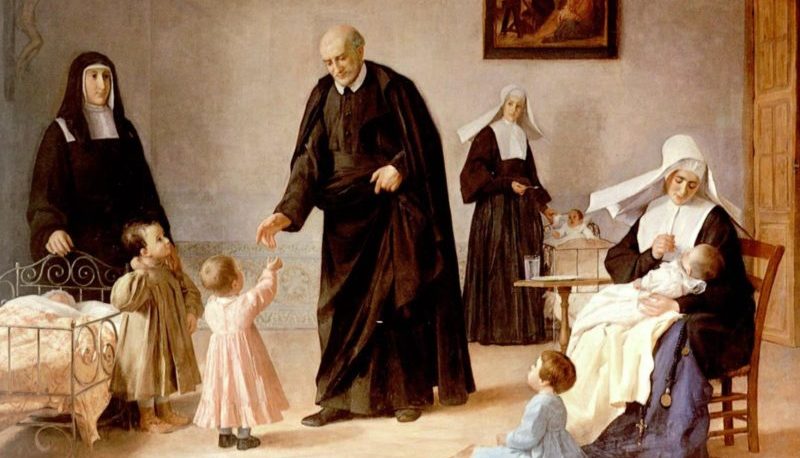




















Vincent de Paul was born in 1581, in the French village of Pouy, now called Saint-Vincent-de Paul.
Your life
Not much is known about his youth. He was ordained a priest on September 23, 1604, having obtained a bachelor's degree in theology.
He arrived in Paris in 1608 and during the period between 1608 and 1617 underwent a profound inner transformation under the influence of Cardinal Pierre de Bérulle. In 1617 his "conversion" to the unevangelized poor and the most needy took place.
In 1625, he founded a community of priests dedicated to the evangelization of poor peasants, which responded to a concrete need, since in France at that time 85 % of the population lived in the countryside. This community was also dedicated to the formation of the clergy. He called it Congregation of the MissionIt is popularly known as "Missionaries of St. Vincent", "Vincentians", or "Lazarists" (because the House of St. Lazarus in Paris was the Mother House of the Congregation until the French Revolution). The Congregation was approved by Pope Urban VIII on January 12, 1633, with the Bull Salvatoris nostri.
She also founded, together with St. Louise de Marillac, a women's community of service, named Daughters of Charity.
St. Vincent de Paul was a true giant of charity and a genius of organizational ability. His charitable works were conceived with the strategy of a battle plan. He also had the merit of knowing how to choose and train his collaborators very well.
St. Vincent de Paul died in Paris on September 27, 1660, and was canonized by Clement XII on March 16, 1737. His feast is celebrated on September 27, the anniversary of his death. dies natalis.
His works
His works are collected in the classic edition by P. Coste, Saint Vincent de Paul. Correspondance, entretiens, documents14 volumes, Paris 1920-1925. They are almost exclusively letters and notes taken by those attending his conferences. He wrote about 30,000 letters, of which only 2,500 have come down to us.
Its spiritual doctrine
It can be affirmed that the spirituality of St. Vincent de Paul was influenced by both Cardinal Pierre de Bérulle and St. Francis de Sales. He elaborates a very personal synthesis of the spiritual doctrine of these two great authors.
Their spirituality is centered on God, the Church and the poor, and deals preferably with ascetic themes: humility, charity, prayer, etc. Its aspiration is to achieve a thorough practice of the Christian virtues in the circumstances of daily life.
The God he contemplates is the Incarnate Word, whom he sees present in the poor. That is why he writes: "God loves the poor, and therefore loves those who love the poor; for when one loves a person very much, one feels affection also for his friends and servants. Thus, the little company of the Mission tries to dedicate itself with love to the service of the poor, who are God's favorites; for this reason we have reason to hope that, out of love for them, God will love us. Let us dedicate ourselves with renewed love to the service of the poor, indeed, let us seek out the most miserable and abandoned, let us acknowledge before God that they are our masters and that we are not worthy to render them our humble services".
For St. Vincent, his spiritual sons should be "Carthusians at home and apostles in the field. From St. Francis de Sales he takes the idea that perfection does not consist in ecstasies, but in the fulfillment of God's will. According to St. Vincent, "affective" love must become "effective love", which consists in "doing the things that the loved one commands and desires. This is what Our Lord intends to speak of when he says: Si quis diligit me, sermonem meum servabitIf anyone loves me, he will keep my word".
Effective love is the surest proof of all love: "Let us love God, brethren, let us love God, but at the cost of our arms, by the sweat of our brow. For very often so many acts of love, of benevolence, and other similar affections and practices of a tender heart, though they are most good, yet they are suspect when they do not come to the practice of effective love. For many, being full of great sentiments, think they have done everything; and when they find themselves in the occasion to act, they draw back. Many are content with the gentle conversations they have with God in prayer, but when they come out of it, if it is a question of working for God, of suffering, of mortifying themselves, of helping the poor, of seeking the lost sheep, of bearing hardships joyfully, of accepting sickness or any other misfortune, they lack the necessary courage."
St. Vincent wants his spiritual sons and daughters to be people capable of finding in the service of others what they had had to abandon in prayer: "One does not leave God for God".
The vocation of the Missionary of Charity and of the Daughters of Charity is to love God and to make him loved: "It is not enough for me to love God if my neighbor does not love him".












